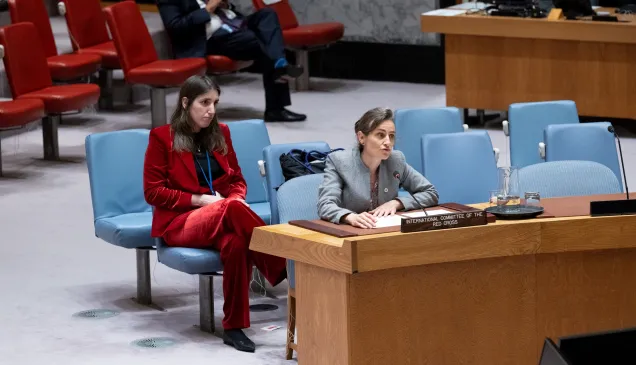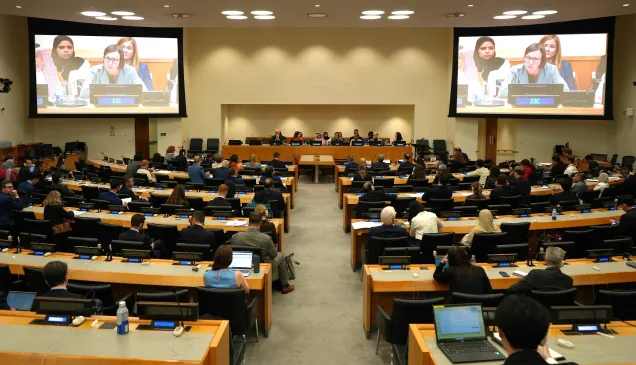In fragile contexts, around the world, we are facing a protection crisis. Its roots lie in the grave, ongoing failure of the international community to protect ordinary men, women and children caught up in conflicts and the inability to fundamentally change the behaviors of belligerents.
The ICRC is a daily witness to the devastating impact of war and violence and we welcome the increased focus on conflict prevention and peace-building. It comes at a critical time:
- In the absence of political solutions in too many contexts;
- As conflicts are increasingly protracted, resulting not only in immediate devastation, but long-term erosion of infrastructure and social systems; and
- With expanding areas of fragility, where sporadic violence can spiral into the conflicts of tomorrow.
Frontline humanitarian action is a vital stabilizing factor in fragmentized environments and a building-block for peace. As too is the promotion of international humanitarian law. Without the stabilizing effect of both - frontline action, and international humanitarian law's respect - without this stabilizing action there is little chance for sustainable peace or for preventing armed conflict.
Indeed, humanitarian assistance is not an objective in itself but can pave the way for peace. Our principle of humanity, which guides the work of the entire Red Cross Red Crescent Movement, is to 'promote mutual understanding, friendship, cooperation and lasting peace amongst all peoples'.
Today the ICRC is fulfilling varying requests to act as a neutral intermediary in conflict. We are called on to prevent relations from deteriorating, prevent conflicts from escalating, or to find mutual trust-building measures that would help advance peace. Our mode of working is distinct, drawing on our humanitarian experience and relying on the principles of neutrality, independence and impartiality.
It is clear that sustainable development will not be achieved if it does not reach those left furthest behind. Principled humanitarian action serves to protect against development reversals caused by the effects of war - destruction, displacement, exclusion, disease and impoverishment. It will be vital that the UN's integrated approach allows the space for principled humanitarian action to continue.
Every day in conflict zones the ICRC shields vulnerable communities by supporting the structures they rely on. Humanitarian action bolsters health systems, shores up electricity and water supplies, supports livelihoods and cash grants for small businesses. Millions of people survive and can go back to previously stable lives because of sustained and long-term humanitarian support of water and waste systems, health systems or investments in community building and livelihood support.
But we cannot stop at mitigating the impact of violence; we must also focus on how wars are conducted and the limits that must be placed on armed actors and their conduct in order to reduce the needs of people.
For me the equation is clear - to end the cycles of violence and inhumanity we must end the free-for-all on the battlefield.
As a neutral humanitarian actor we can talk to all parties, states, non-state armed groups, partners and allies, and all who can influence. When there is humanity in war and respect for IHL there is a better chance for peace.
International humanitarian law has positive and multiplying impacts when it is respected. For example when the principles of proportionality and distinction are applied, lives are saved, hospitals and schools remain open and markets can function. These are factors that all contribute to stability and to pave the way for development and future peace.
In this discussion we cannot ignore all that stems from the supply and use of weapons. Widespread and poorly controlled availability of arms due to irresponsible transfers to irresponsible actors are a major cause of suffering. Therefore, I would like to highlight that:
- Arms transfers must ensure, weapons do not end up being used to commit serious violations of IHL;
- Legal weapons must always be used in accordance with IHL;
- Illegal weapons – like chemical and biological weapons – must never be used; and
- Nuclear weapons, because of their devastating humanitarian effect, deserve greater attention and efforts with a view to prohibit and eliminate.
Dear colleagues, in implementing this agenda, we urge that the UN ensure:
- There is increased commitment from all States for neutral, impartial humanitarian action and for this stabilizing role to remain distinctive;
- That frontline action is supported by greater engagement and investment by development actors;
- The agenda is pursued with a 'do no harm' approach, without creating new grievances or exacerbating existing ones;
- That the voices of the furthest away, the hardest to reach are incorporated. True integration cannot be done from New York or Geneva, but close to people affected.



